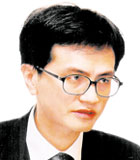![]()
Gear Up | Winning Words
Broaden Your Network | Learners' Light | Enrich Your Readings
On Education
On Education - Interviews with professors and department heads cover the hottest courses available at the eight higher education institutions and the resulting career opportunities.
|
Building a career from the ground up
by Melinda Earsdon
Hong Kong has provided the inspiration for some of the world's finest architects, including Norman Foster and IM Pei but also serves to inspire the students of The University of Hong Kong (HKU)'s prestigious Faculty of Architecture which offers comprehensive courses in all areas of architecture, real estate and construction. And, since 100 percent of the faculty's graduates find a job within six months of leaving, it is easy to see why the faculty provides an excellent springboard to career success. The oldest in town The oldest architectural school in the territory, HKU's prestigious Faculty of Architecture dates back to 1950 and currently features two core departments. The Department of Architecture offers courses in the disciplines of architecture, urban design and landscape architecture, while the Department of Real Estate and Construction offers courses in the disciplines of surveying, construction project management and real estate development. Additionally, the Centre of Urban Planning and Environmental Management, a non-core academic unit, cooffers programmes on the disciplines of urban planning, environmental management, housing management and transport policy planning. Prof KW Chau, dean of the faculty and chair of the Department of Real Estate and Construction, notes that the faculty has come a long way since its inception: "The student body has doubled in size and the number of teaching staff has increased from 30 to 45. The courses on offer have been restructured to cater to the demands of today's market and our teaching methods and facilities are at the cutting edge of design technology." Commitment to architecture The study path of an architect is a committed one. A candidate must first complete a three-year Bachelor of Arts in Architectural Studies (BAAS) programme, then a two-year master's degree, followed by a further two years of practical experience in the industry, before they are allowed to sit the professional examination that will allow them to practice as an architect. As such, it is very important to choose the right bachelor's degree. HKU's Department of Architecture offers one of the best BAAS programmes in the region. This aims to prepare graduates for the next step, while providing enough knowledge and skills to carry them into a different profession, should they decide on a different career path. Fully comprehensive, the programme includes courses on architectural design, the history and theory of architecture, the principles of buildings, visual communications, architecture and design appreciation, urbanism, building structures, building services, building technology and materials. The department employs state-of-the-art teaching methods to train its budding architects. "We specialise in problem-based learning," says Prof Chau. "We have built a studio in which students can design and learn together in a simulation of an office environment. This provides a forum for ideas and allows students to be adventurous in their design. They can make mistakes here and learn from them." Admissions and alumni As the department accepts only 69 students every year, competition is fierce. The average A-level of BAAS intakes is significantly above the average HKU A-level results. In addition, applicants must sit the department's aptitude test. Prof Chau explains, "To be a good architect, you have to be able to express yourself both verbally and visually. Creativity is obviously very important, as is a capacity to relate to the concept of space. You need to be inquisitive and possess initiative. Many students believe they have what it takes but, once the course starts, find they are unhappy. Our aptitude test is designed to cut down on the number of mid-course transfers and recruit only those people we believe will see it through." Students joining the department are in good company. Famous alumni include the current president of the Hong Kong Institute of Architects, John PL Wong, and Rocco Yim, who designed the Graduate House at the University of Hong Kong and several other campus buildings.
Taken from Career Times 2003/04/11 |
|||||||
(11-20 of 68)
A booming market
(2003/07/25)
A leader or a follower...
(2003/07/11)
A classical education
(2003/06/27)
Training for an engineered world
(2003/06/13)
In the market for professionalism
(2003/05/30)
A broader outlook on business
(2003/05/16)
Building a career from the ground up
(2003/04/11)
No ordinary language school
(2003/04/04)
The business of learning
(2003/03/28)
Using geography to understand the world
(2003/03/14)
(11-20 of 68)


